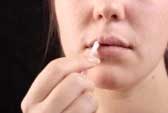Herpes Test | Is there an at home herpes test?
Get Tests for Herpes Now!
Don’t sit around worrying! Take action and take back control! Visit our home page for Confidential Testing!
click here!
Herpes Tests
The good news is testing can be done to detect the presence of the herpes virus. Knowledge is power so if you have a concern that you may have herpes, please get tested. Even if there is no active lesion you can still be contagious.
It is very important for you to know since you can give herpes to someone else without knowing you have it. Children, with an undeveloped immune system, can be exposed to Herpes 1 with a simple kiss from a loved one, then they can have herpes forever! The highest incidence of initial infection occurs between six months and three years of age. By adolescence, 62% of Americans have been infected with Herpes 1. About 90% of Americans test positive for antibodies to Herpes 1!
There are different types of testing for herpes:
-
Viral Culture Test:
This is the best way to detect genital herpes! The herpes lesion must be active or you can get a false-negative result. Take a swab and collect fluid or cells from the active lesion. This test can also tell if the virus is HSV-1 or HSV-2.
The culture test is the test offered confidentially on our home page.
Girl is swabbing her cold sore for a culture
Confidential Herpes Test – Is Your Privacy Important to You?
You can take it in the privacy of your home. No one knows who you are. The results then go to Private Diagnostics and they send the results to you in a secure manner with a password that only you and Private Diagnostics know.
This at home test is offered confidentially on our home page through Private Diagnostics. We suggest ordering 2, 1 for yourself and 1 for your partner, and have them on hand when you have an outbreak. Remember, you can get a false-negative if the sore has healed over so be prepared! Sometimes more than one test may be necessary.
-
Antibody or Blood Test
The blood test detects the levels of antibodies in the blood used to fight the herpes virus. Most of these tests can’t distinguish between a current infection or a recurrent herpes infection. Some can tell the difference between herpes 1 and herpes 2. If a person has been recently infected they might not get a positve antibody test, because the antibodies haven’t developed yet. it takes between two weeks to three months after exposure for antibodies to appear in the blood. The blood test is not as accurate as the viral culture test to diagnosis a specific lesion, because it only tests whether a person has been exposed to the herpes virus.
The Western Blot Serology has been the "gold standard" since 1987 for herpes specific antibody detection but expensive and difficult to administer. The POCkit test is specific and will detect antibodies and is available through a physician. IgG/IgM (Elisa) blood test can determine if a person has a current infection or antibodies from a previous infection. A positive IgM means that the infection is active.
-
Polymerase Chain Reaction or PCR Test
A newer "gold standard", the PCR (Polymerase Chain Reaction) DNA test, identifies the DNA from the virus and can differentiate between HSV1 and HSV2. One of the problems may be a false positive for HSV2 for persons with an oral HSV1 infection. PCR techniques make many copies of the viral genetic material either DNA or RNA in a short time (4 hours) so that even tiny amounts of virus are senough for a positive test. This makes the PCR test an accurate and reliable way to diagnose herpes. This test requires the presence of active viral shredding. It can be done on cells or fluid from a sore or on blood or on other fluid such as the person’s spinal fluid. PCR tests are not widely available and more expensive than culture and other herpes tests.
-
Antigen Test
The antigen test is similar to the culture method, and also looks for the presence of the herpes virus in the lesion. Rather than growing the virus as in the culture test, this test identifies the herpes by the presence of antigens. An antigen is a substance that causes your immune system to produce antibodies against it, in this case, the herpes virus. As in the viral culture, a swab is taken then smeared onto a microscope slide. Antigen detection assays are less sensitive than viral cultures. The anigen test cannot determine whether the sample is infected with HSV-1 or HSV-2. Antigen detection is usually done in research labs or large reference laboratories.
-
Tzanck Test
TheTzanck Test is generally not recommended because it not a specific test for herpes. Using a scraping to look for Tzanck cells, it is sometimes called the Chickenpox skin test.
-
Pap Smear
The Pap smear is generally not recommended because it not a specific test for herpes. Sometimes a “silver pap” is given, a pap with a herpes PCR test built in. It often includes tests for chlamydia, gonorrhea, and herpes. The problem is that if there was no herpes virus present at the moment the pap was taken, and the test came back negative you can still have herpes, because you have to have an active infection for the test to be accurate.
purchase Your Confidentail Tests to have on hand to test outbreaks before the lesions heal so you can get accurate test results!

Purchase at home tests at Private Diagnostics link on home page

Top 10 Herpes Facts
Sex Health Guru Video Tip brought to you by Alice W. Kp M.D. John Hopkins Hospital, Watch the Video

Featured Article
The Truth about HSV-1 and HSV-2 American Social Health Association (ASHA), read the Article

Other Infections
Do you also think you may have been exposed to another STD? Find help now. www.stdsite.com



